Analysis of the Privacy Hit Tipping Point in 2016: A Report
VerifiedAdded on 2020/05/28
|8
|1723
|62
Report
AI Summary
This report examines the privacy hit tipping point of 2016, focusing on the ethical considerations surrounding data security and user privacy in the context of internet usage and advertising. It explores four key ethical perspectives: utilitarianism, deontology, virtue ethics, and contract theory. The utilitarian perspective highlights the importance of user happiness and the impact of advertisements, suggesting that reducing distractions enhances user experience. The deontological perspective addresses the ethical implications of hacking and data breaches, emphasizing the importance of respecting user consent. Virtue ethics provides different viewpoints on the blocking of advertisements and the benefits for users and advertisers. The contract perspective considers the legal and moral frameworks governing data privacy, particularly in the context of the Internet of Things and the actions of hackers. The report concludes with recommendations for improving website design, enhancing security, and ensuring appropriate consequences for data breaches. References to relevant research papers are provided throughout the report.
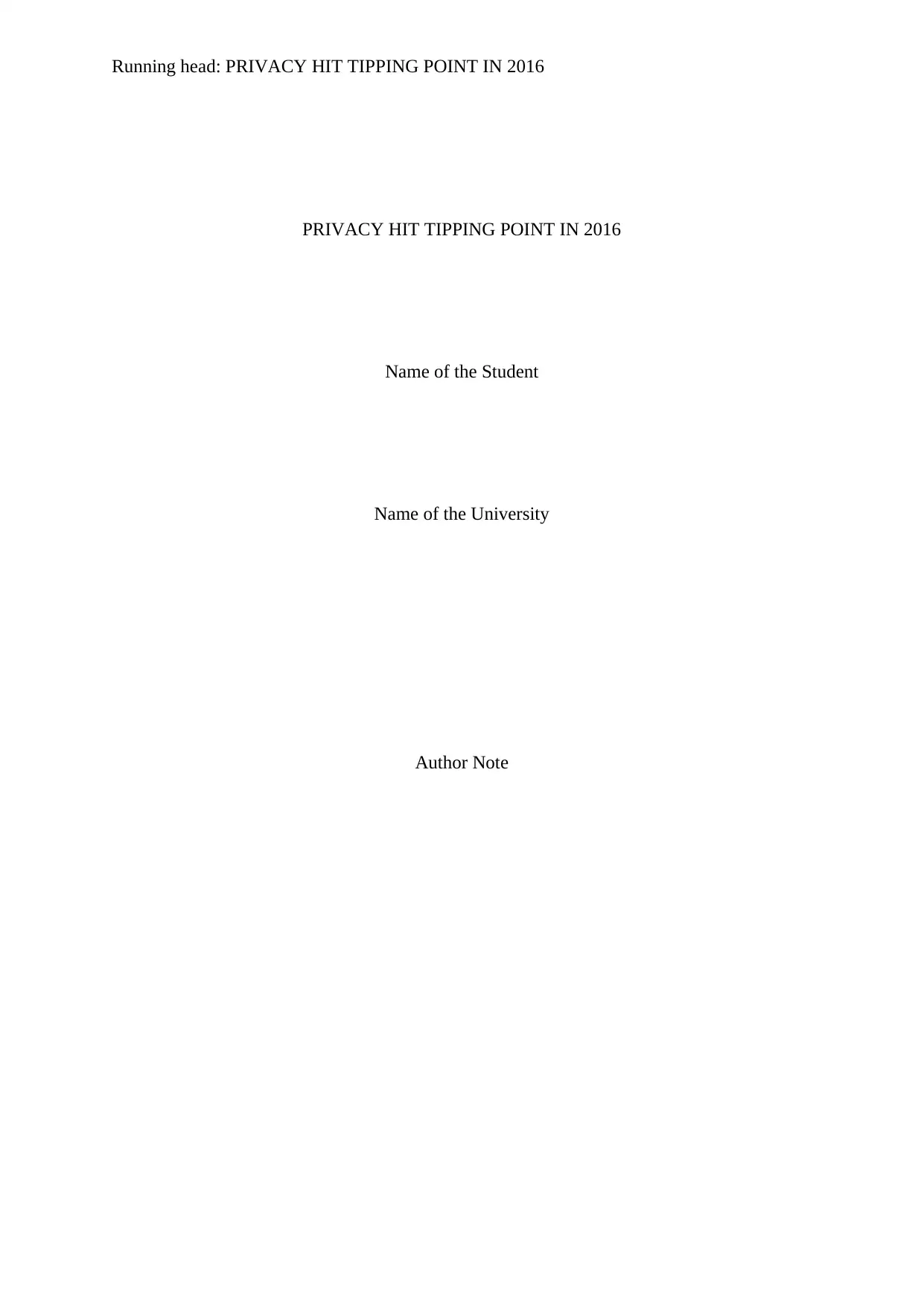
Running head: PRIVACY HIT TIPPING POINT IN 2016
PRIVACY HIT TIPPING POINT IN 2016
Name of the Student
Name of the University
Author Note
PRIVACY HIT TIPPING POINT IN 2016
Name of the Student
Name of the University
Author Note
Paraphrase This Document
Need a fresh take? Get an instant paraphrase of this document with our AI Paraphraser
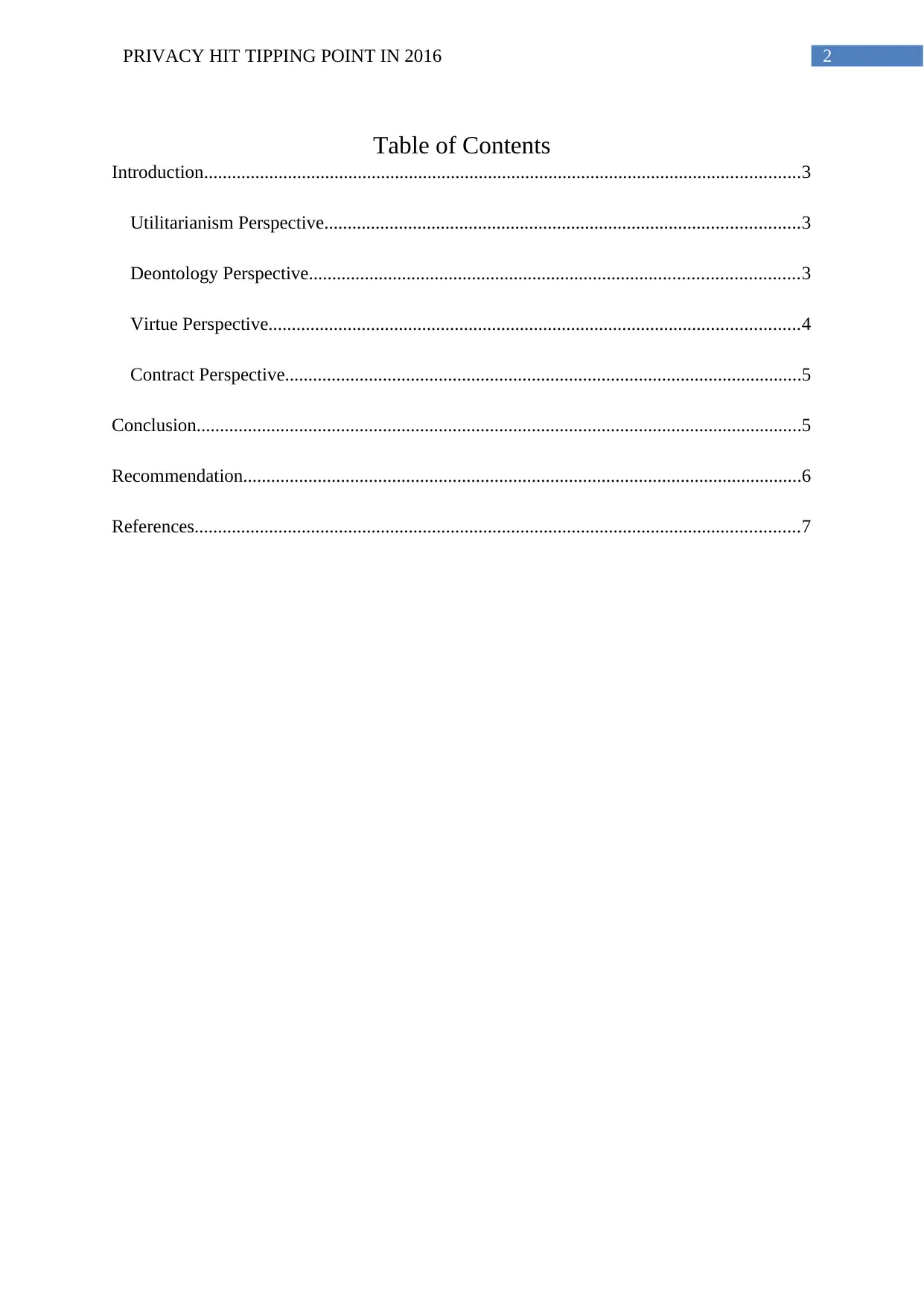
2PRIVACY HIT TIPPING POINT IN 2016
Table of Contents
Introduction................................................................................................................................3
Utilitarianism Perspective......................................................................................................3
Deontology Perspective.........................................................................................................3
Virtue Perspective..................................................................................................................4
Contract Perspective...............................................................................................................5
Conclusion..................................................................................................................................5
Recommendation........................................................................................................................6
References..................................................................................................................................7
Table of Contents
Introduction................................................................................................................................3
Utilitarianism Perspective......................................................................................................3
Deontology Perspective.........................................................................................................3
Virtue Perspective..................................................................................................................4
Contract Perspective...............................................................................................................5
Conclusion..................................................................................................................................5
Recommendation........................................................................................................................6
References..................................................................................................................................7
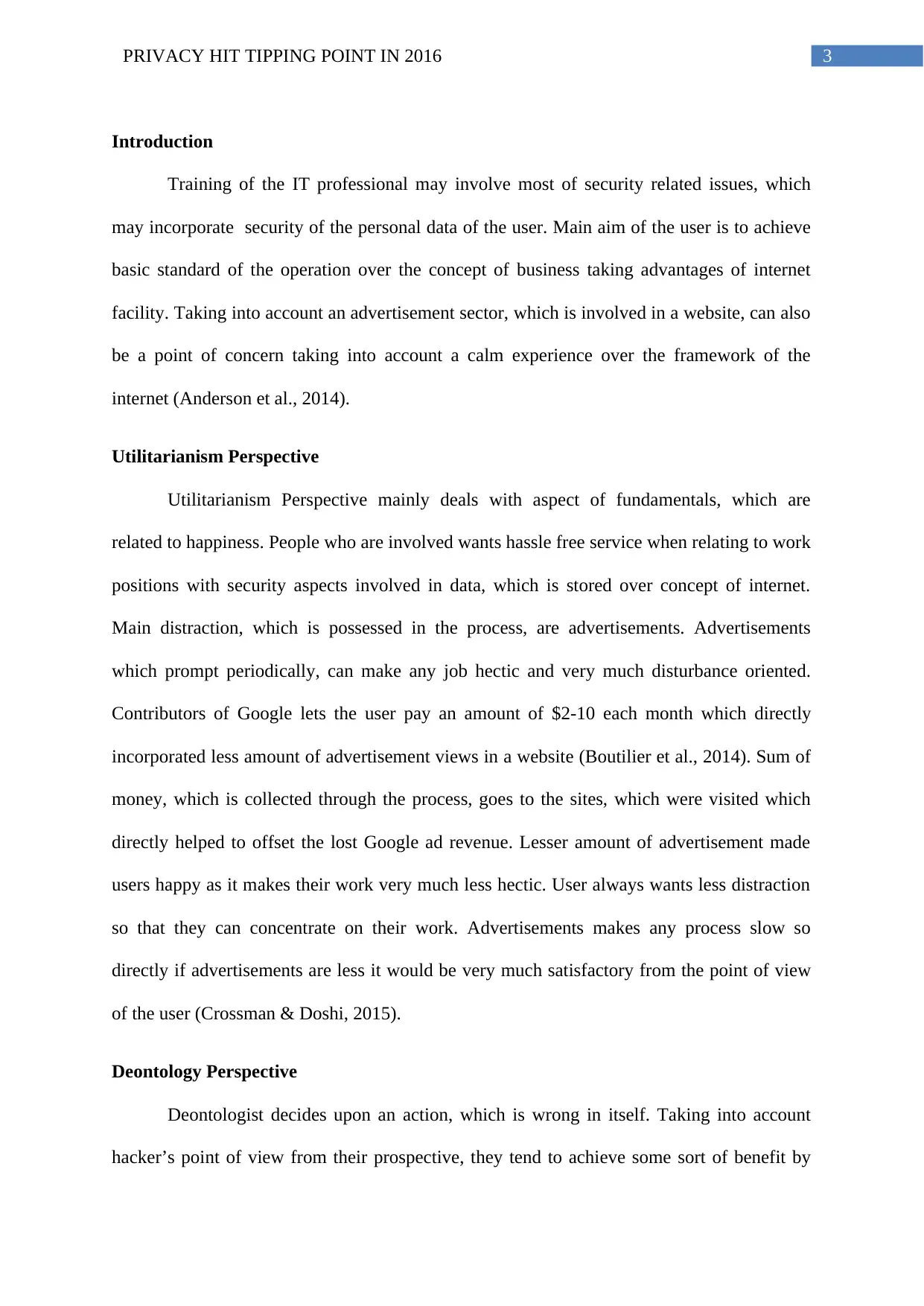
3PRIVACY HIT TIPPING POINT IN 2016
Introduction
Training of the IT professional may involve most of security related issues, which
may incorporate security of the personal data of the user. Main aim of the user is to achieve
basic standard of the operation over the concept of business taking advantages of internet
facility. Taking into account an advertisement sector, which is involved in a website, can also
be a point of concern taking into account a calm experience over the framework of the
internet (Anderson et al., 2014).
Utilitarianism Perspective
Utilitarianism Perspective mainly deals with aspect of fundamentals, which are
related to happiness. People who are involved wants hassle free service when relating to work
positions with security aspects involved in data, which is stored over concept of internet.
Main distraction, which is possessed in the process, are advertisements. Advertisements
which prompt periodically, can make any job hectic and very much disturbance oriented.
Contributors of Google lets the user pay an amount of $2-10 each month which directly
incorporated less amount of advertisement views in a website (Boutilier et al., 2014). Sum of
money, which is collected through the process, goes to the sites, which were visited which
directly helped to offset the lost Google ad revenue. Lesser amount of advertisement made
users happy as it makes their work very much less hectic. User always wants less distraction
so that they can concentrate on their work. Advertisements makes any process slow so
directly if advertisements are less it would be very much satisfactory from the point of view
of the user (Crossman & Doshi, 2015).
Deontology Perspective
Deontologist decides upon an action, which is wrong in itself. Taking into account
hacker’s point of view from their prospective, they tend to achieve some sort of benefit by
Introduction
Training of the IT professional may involve most of security related issues, which
may incorporate security of the personal data of the user. Main aim of the user is to achieve
basic standard of the operation over the concept of business taking advantages of internet
facility. Taking into account an advertisement sector, which is involved in a website, can also
be a point of concern taking into account a calm experience over the framework of the
internet (Anderson et al., 2014).
Utilitarianism Perspective
Utilitarianism Perspective mainly deals with aspect of fundamentals, which are
related to happiness. People who are involved wants hassle free service when relating to work
positions with security aspects involved in data, which is stored over concept of internet.
Main distraction, which is possessed in the process, are advertisements. Advertisements
which prompt periodically, can make any job hectic and very much disturbance oriented.
Contributors of Google lets the user pay an amount of $2-10 each month which directly
incorporated less amount of advertisement views in a website (Boutilier et al., 2014). Sum of
money, which is collected through the process, goes to the sites, which were visited which
directly helped to offset the lost Google ad revenue. Lesser amount of advertisement made
users happy as it makes their work very much less hectic. User always wants less distraction
so that they can concentrate on their work. Advertisements makes any process slow so
directly if advertisements are less it would be very much satisfactory from the point of view
of the user (Crossman & Doshi, 2015).
Deontology Perspective
Deontologist decides upon an action, which is wrong in itself. Taking into account
hacker’s point of view from their prospective, they tend to achieve some sort of benefit by
⊘ This is a preview!⊘
Do you want full access?
Subscribe today to unlock all pages.

Trusted by 1+ million students worldwide
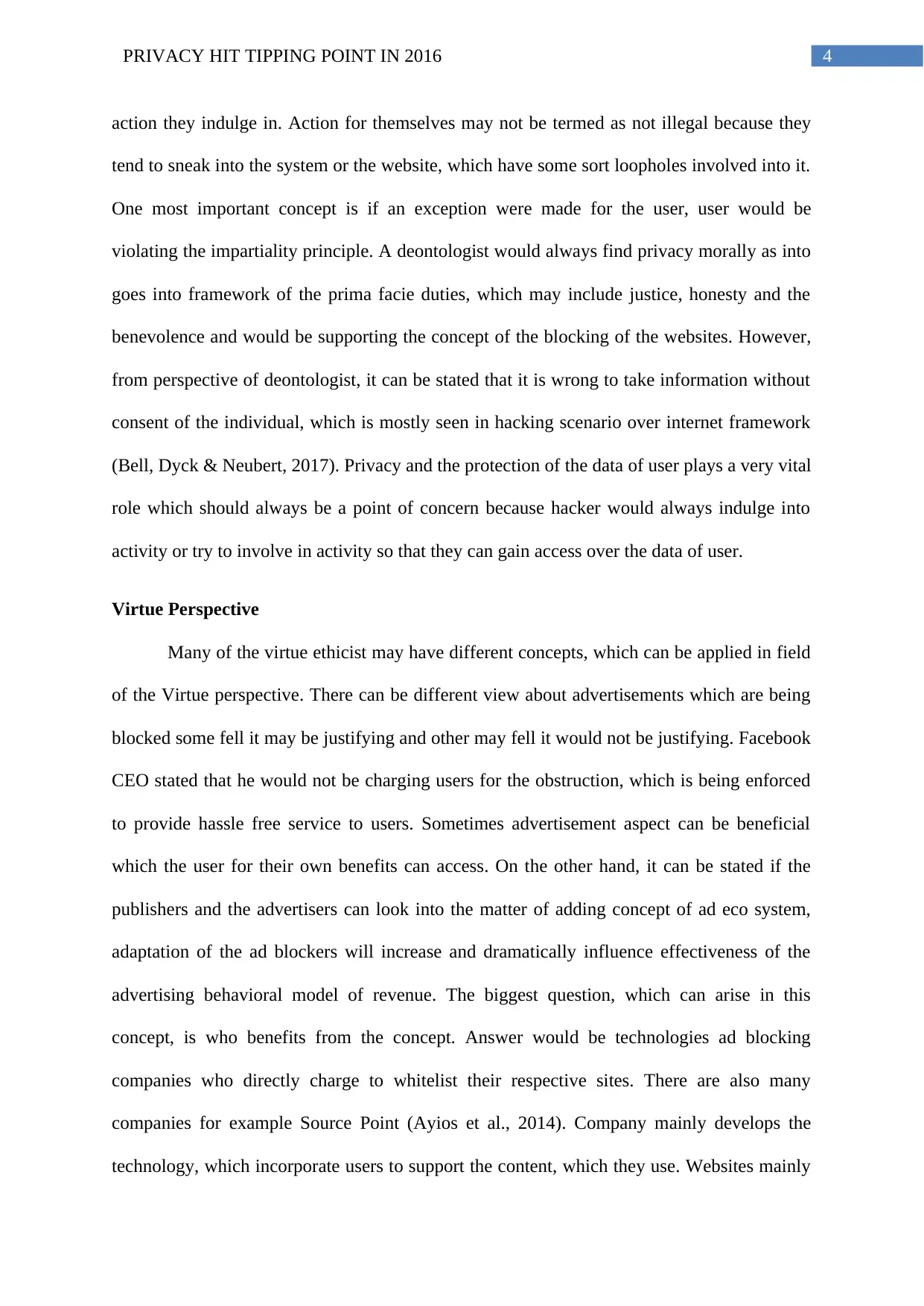
4PRIVACY HIT TIPPING POINT IN 2016
action they indulge in. Action for themselves may not be termed as not illegal because they
tend to sneak into the system or the website, which have some sort loopholes involved into it.
One most important concept is if an exception were made for the user, user would be
violating the impartiality principle. A deontologist would always find privacy morally as into
goes into framework of the prima facie duties, which may include justice, honesty and the
benevolence and would be supporting the concept of the blocking of the websites. However,
from perspective of deontologist, it can be stated that it is wrong to take information without
consent of the individual, which is mostly seen in hacking scenario over internet framework
(Bell, Dyck & Neubert, 2017). Privacy and the protection of the data of user plays a very vital
role which should always be a point of concern because hacker would always indulge into
activity or try to involve in activity so that they can gain access over the data of user.
Virtue Perspective
Many of the virtue ethicist may have different concepts, which can be applied in field
of the Virtue perspective. There can be different view about advertisements which are being
blocked some fell it may be justifying and other may fell it would not be justifying. Facebook
CEO stated that he would not be charging users for the obstruction, which is being enforced
to provide hassle free service to users. Sometimes advertisement aspect can be beneficial
which the user for their own benefits can access. On the other hand, it can be stated if the
publishers and the advertisers can look into the matter of adding concept of ad eco system,
adaptation of the ad blockers will increase and dramatically influence effectiveness of the
advertising behavioral model of revenue. The biggest question, which can arise in this
concept, is who benefits from the concept. Answer would be technologies ad blocking
companies who directly charge to whitelist their respective sites. There are also many
companies for example Source Point (Ayios et al., 2014). Company mainly develops the
technology, which incorporate users to support the content, which they use. Websites mainly
action they indulge in. Action for themselves may not be termed as not illegal because they
tend to sneak into the system or the website, which have some sort loopholes involved into it.
One most important concept is if an exception were made for the user, user would be
violating the impartiality principle. A deontologist would always find privacy morally as into
goes into framework of the prima facie duties, which may include justice, honesty and the
benevolence and would be supporting the concept of the blocking of the websites. However,
from perspective of deontologist, it can be stated that it is wrong to take information without
consent of the individual, which is mostly seen in hacking scenario over internet framework
(Bell, Dyck & Neubert, 2017). Privacy and the protection of the data of user plays a very vital
role which should always be a point of concern because hacker would always indulge into
activity or try to involve in activity so that they can gain access over the data of user.
Virtue Perspective
Many of the virtue ethicist may have different concepts, which can be applied in field
of the Virtue perspective. There can be different view about advertisements which are being
blocked some fell it may be justifying and other may fell it would not be justifying. Facebook
CEO stated that he would not be charging users for the obstruction, which is being enforced
to provide hassle free service to users. Sometimes advertisement aspect can be beneficial
which the user for their own benefits can access. On the other hand, it can be stated if the
publishers and the advertisers can look into the matter of adding concept of ad eco system,
adaptation of the ad blockers will increase and dramatically influence effectiveness of the
advertising behavioral model of revenue. The biggest question, which can arise in this
concept, is who benefits from the concept. Answer would be technologies ad blocking
companies who directly charge to whitelist their respective sites. There are also many
companies for example Source Point (Ayios et al., 2014). Company mainly develops the
technology, which incorporate users to support the content, which they use. Websites mainly
Paraphrase This Document
Need a fresh take? Get an instant paraphrase of this document with our AI Paraphraser
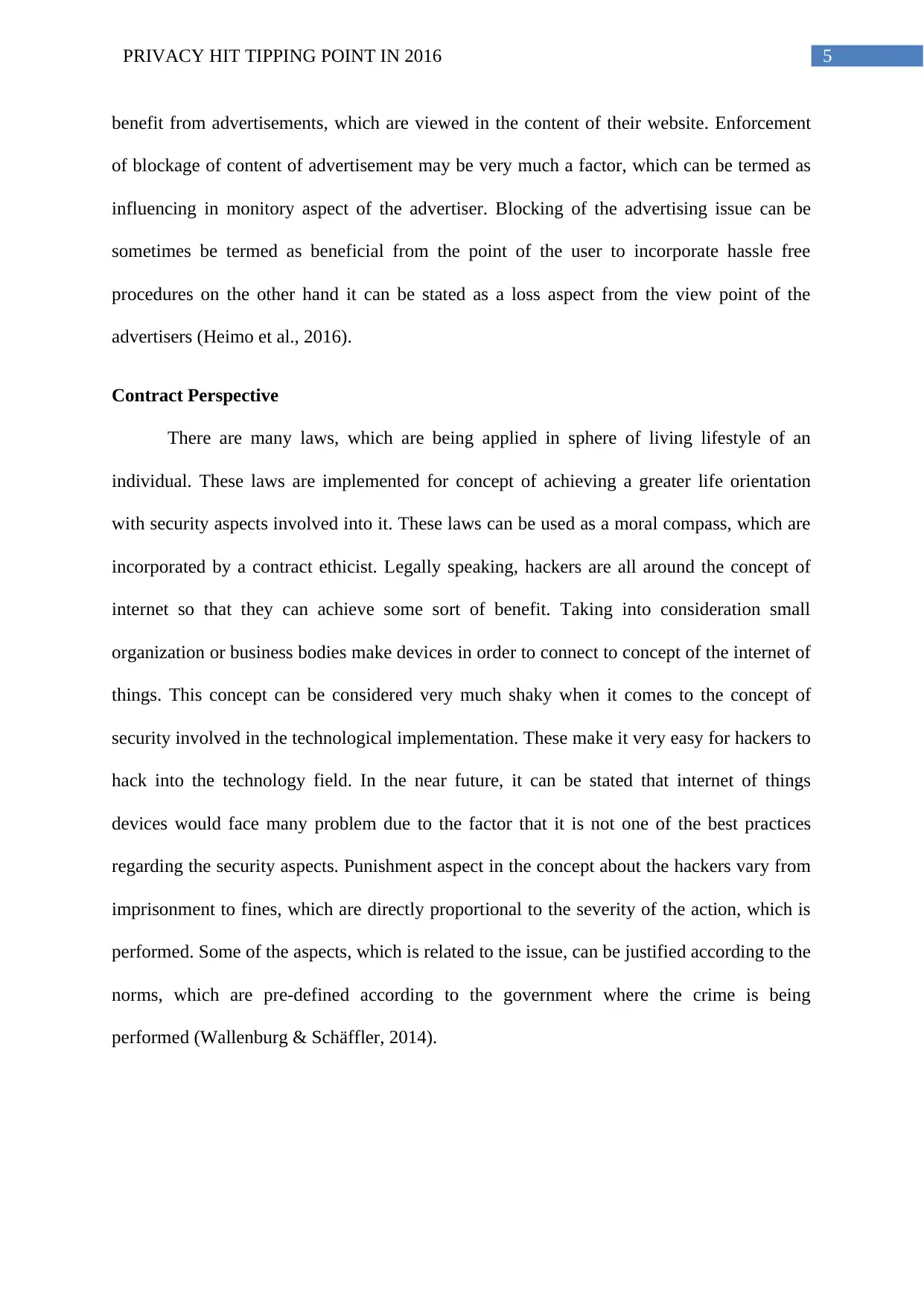
5PRIVACY HIT TIPPING POINT IN 2016
benefit from advertisements, which are viewed in the content of their website. Enforcement
of blockage of content of advertisement may be very much a factor, which can be termed as
influencing in monitory aspect of the advertiser. Blocking of the advertising issue can be
sometimes be termed as beneficial from the point of the user to incorporate hassle free
procedures on the other hand it can be stated as a loss aspect from the view point of the
advertisers (Heimo et al., 2016).
Contract Perspective
There are many laws, which are being applied in sphere of living lifestyle of an
individual. These laws are implemented for concept of achieving a greater life orientation
with security aspects involved into it. These laws can be used as a moral compass, which are
incorporated by a contract ethicist. Legally speaking, hackers are all around the concept of
internet so that they can achieve some sort of benefit. Taking into consideration small
organization or business bodies make devices in order to connect to concept of the internet of
things. This concept can be considered very much shaky when it comes to the concept of
security involved in the technological implementation. These make it very easy for hackers to
hack into the technology field. In the near future, it can be stated that internet of things
devices would face many problem due to the factor that it is not one of the best practices
regarding the security aspects. Punishment aspect in the concept about the hackers vary from
imprisonment to fines, which are directly proportional to the severity of the action, which is
performed. Some of the aspects, which is related to the issue, can be justified according to the
norms, which are pre-defined according to the government where the crime is being
performed (Wallenburg & Schäffler, 2014).
benefit from advertisements, which are viewed in the content of their website. Enforcement
of blockage of content of advertisement may be very much a factor, which can be termed as
influencing in monitory aspect of the advertiser. Blocking of the advertising issue can be
sometimes be termed as beneficial from the point of the user to incorporate hassle free
procedures on the other hand it can be stated as a loss aspect from the view point of the
advertisers (Heimo et al., 2016).
Contract Perspective
There are many laws, which are being applied in sphere of living lifestyle of an
individual. These laws are implemented for concept of achieving a greater life orientation
with security aspects involved into it. These laws can be used as a moral compass, which are
incorporated by a contract ethicist. Legally speaking, hackers are all around the concept of
internet so that they can achieve some sort of benefit. Taking into consideration small
organization or business bodies make devices in order to connect to concept of the internet of
things. This concept can be considered very much shaky when it comes to the concept of
security involved in the technological implementation. These make it very easy for hackers to
hack into the technology field. In the near future, it can be stated that internet of things
devices would face many problem due to the factor that it is not one of the best practices
regarding the security aspects. Punishment aspect in the concept about the hackers vary from
imprisonment to fines, which are directly proportional to the severity of the action, which is
performed. Some of the aspects, which is related to the issue, can be justified according to the
norms, which are pre-defined according to the government where the crime is being
performed (Wallenburg & Schäffler, 2014).
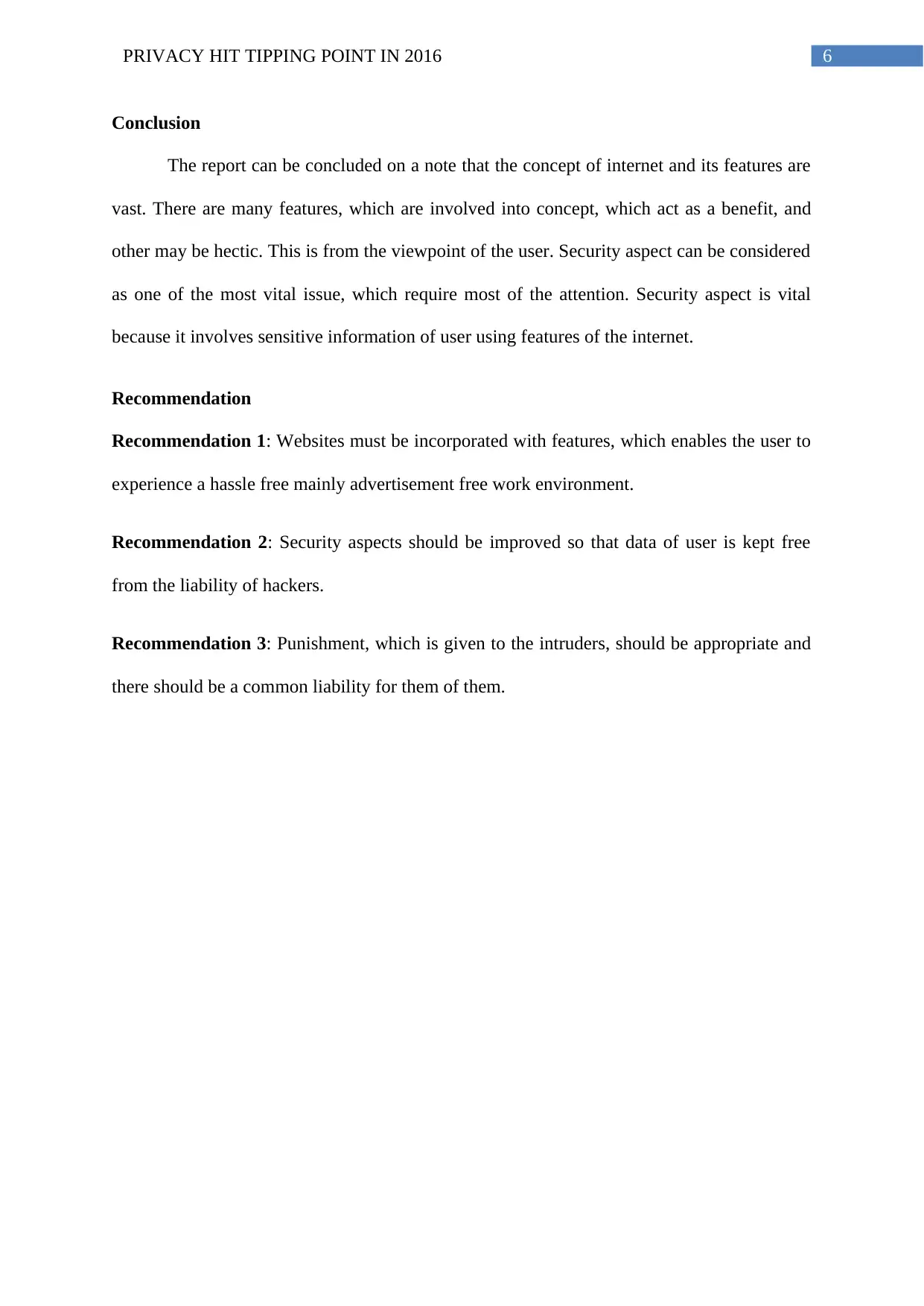
6PRIVACY HIT TIPPING POINT IN 2016
Conclusion
The report can be concluded on a note that the concept of internet and its features are
vast. There are many features, which are involved into concept, which act as a benefit, and
other may be hectic. This is from the viewpoint of the user. Security aspect can be considered
as one of the most vital issue, which require most of the attention. Security aspect is vital
because it involves sensitive information of user using features of the internet.
Recommendation
Recommendation 1: Websites must be incorporated with features, which enables the user to
experience a hassle free mainly advertisement free work environment.
Recommendation 2: Security aspects should be improved so that data of user is kept free
from the liability of hackers.
Recommendation 3: Punishment, which is given to the intruders, should be appropriate and
there should be a common liability for them of them.
Conclusion
The report can be concluded on a note that the concept of internet and its features are
vast. There are many features, which are involved into concept, which act as a benefit, and
other may be hectic. This is from the viewpoint of the user. Security aspect can be considered
as one of the most vital issue, which require most of the attention. Security aspect is vital
because it involves sensitive information of user using features of the internet.
Recommendation
Recommendation 1: Websites must be incorporated with features, which enables the user to
experience a hassle free mainly advertisement free work environment.
Recommendation 2: Security aspects should be improved so that data of user is kept free
from the liability of hackers.
Recommendation 3: Punishment, which is given to the intruders, should be appropriate and
there should be a common liability for them of them.
⊘ This is a preview!⊘
Do you want full access?
Subscribe today to unlock all pages.

Trusted by 1+ million students worldwide
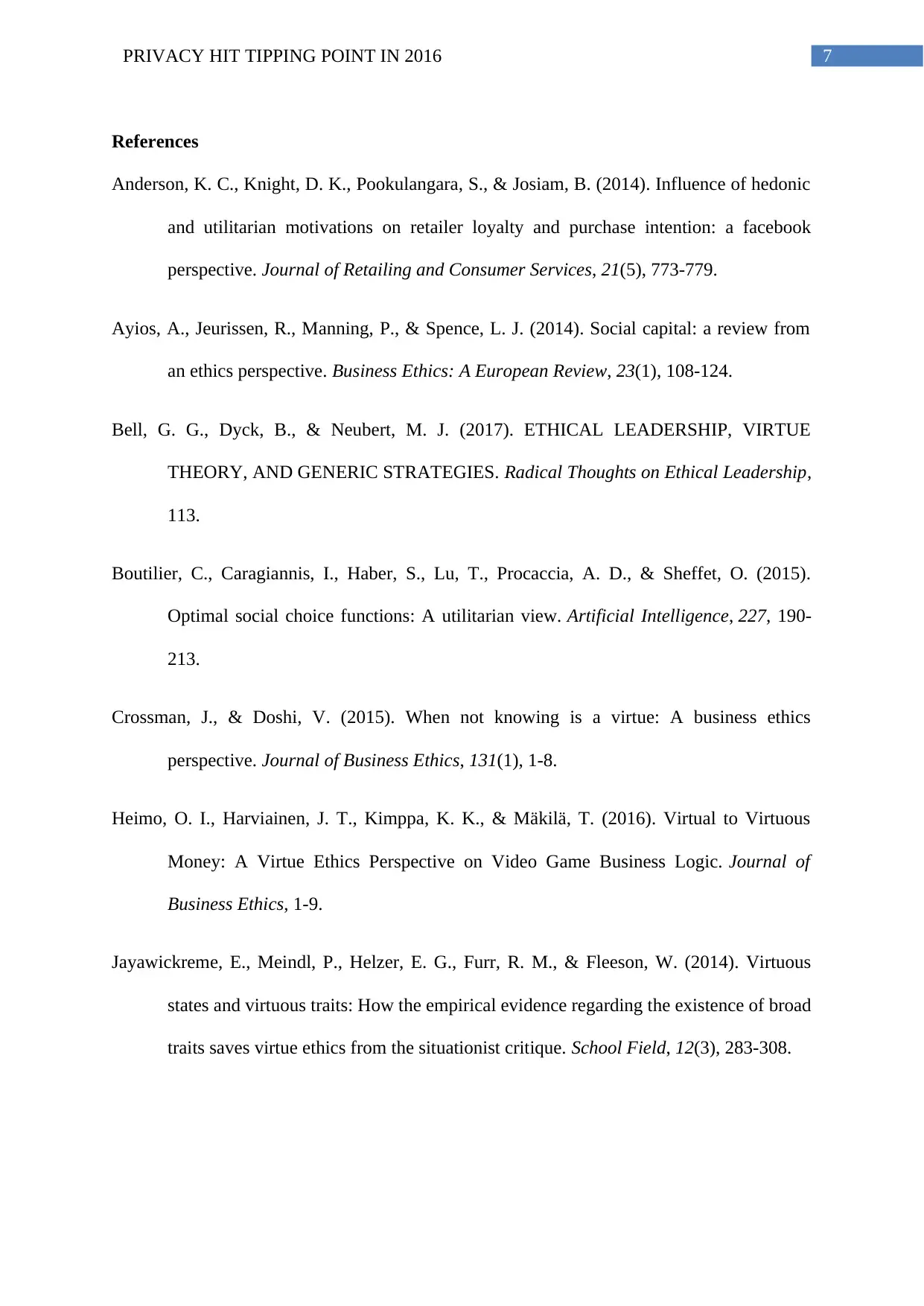
7PRIVACY HIT TIPPING POINT IN 2016
References
Anderson, K. C., Knight, D. K., Pookulangara, S., & Josiam, B. (2014). Influence of hedonic
and utilitarian motivations on retailer loyalty and purchase intention: a facebook
perspective. Journal of Retailing and Consumer Services, 21(5), 773-779.
Ayios, A., Jeurissen, R., Manning, P., & Spence, L. J. (2014). Social capital: a review from
an ethics perspective. Business Ethics: A European Review, 23(1), 108-124.
Bell, G. G., Dyck, B., & Neubert, M. J. (2017). ETHICAL LEADERSHIP, VIRTUE
THEORY, AND GENERIC STRATEGIES. Radical Thoughts on Ethical Leadership,
113.
Boutilier, C., Caragiannis, I., Haber, S., Lu, T., Procaccia, A. D., & Sheffet, O. (2015).
Optimal social choice functions: A utilitarian view. Artificial Intelligence, 227, 190-
213.
Crossman, J., & Doshi, V. (2015). When not knowing is a virtue: A business ethics
perspective. Journal of Business Ethics, 131(1), 1-8.
Heimo, O. I., Harviainen, J. T., Kimppa, K. K., & Mäkilä, T. (2016). Virtual to Virtuous
Money: A Virtue Ethics Perspective on Video Game Business Logic. Journal of
Business Ethics, 1-9.
Jayawickreme, E., Meindl, P., Helzer, E. G., Furr, R. M., & Fleeson, W. (2014). Virtuous
states and virtuous traits: How the empirical evidence regarding the existence of broad
traits saves virtue ethics from the situationist critique. School Field, 12(3), 283-308.
References
Anderson, K. C., Knight, D. K., Pookulangara, S., & Josiam, B. (2014). Influence of hedonic
and utilitarian motivations on retailer loyalty and purchase intention: a facebook
perspective. Journal of Retailing and Consumer Services, 21(5), 773-779.
Ayios, A., Jeurissen, R., Manning, P., & Spence, L. J. (2014). Social capital: a review from
an ethics perspective. Business Ethics: A European Review, 23(1), 108-124.
Bell, G. G., Dyck, B., & Neubert, M. J. (2017). ETHICAL LEADERSHIP, VIRTUE
THEORY, AND GENERIC STRATEGIES. Radical Thoughts on Ethical Leadership,
113.
Boutilier, C., Caragiannis, I., Haber, S., Lu, T., Procaccia, A. D., & Sheffet, O. (2015).
Optimal social choice functions: A utilitarian view. Artificial Intelligence, 227, 190-
213.
Crossman, J., & Doshi, V. (2015). When not knowing is a virtue: A business ethics
perspective. Journal of Business Ethics, 131(1), 1-8.
Heimo, O. I., Harviainen, J. T., Kimppa, K. K., & Mäkilä, T. (2016). Virtual to Virtuous
Money: A Virtue Ethics Perspective on Video Game Business Logic. Journal of
Business Ethics, 1-9.
Jayawickreme, E., Meindl, P., Helzer, E. G., Furr, R. M., & Fleeson, W. (2014). Virtuous
states and virtuous traits: How the empirical evidence regarding the existence of broad
traits saves virtue ethics from the situationist critique. School Field, 12(3), 283-308.
Paraphrase This Document
Need a fresh take? Get an instant paraphrase of this document with our AI Paraphraser
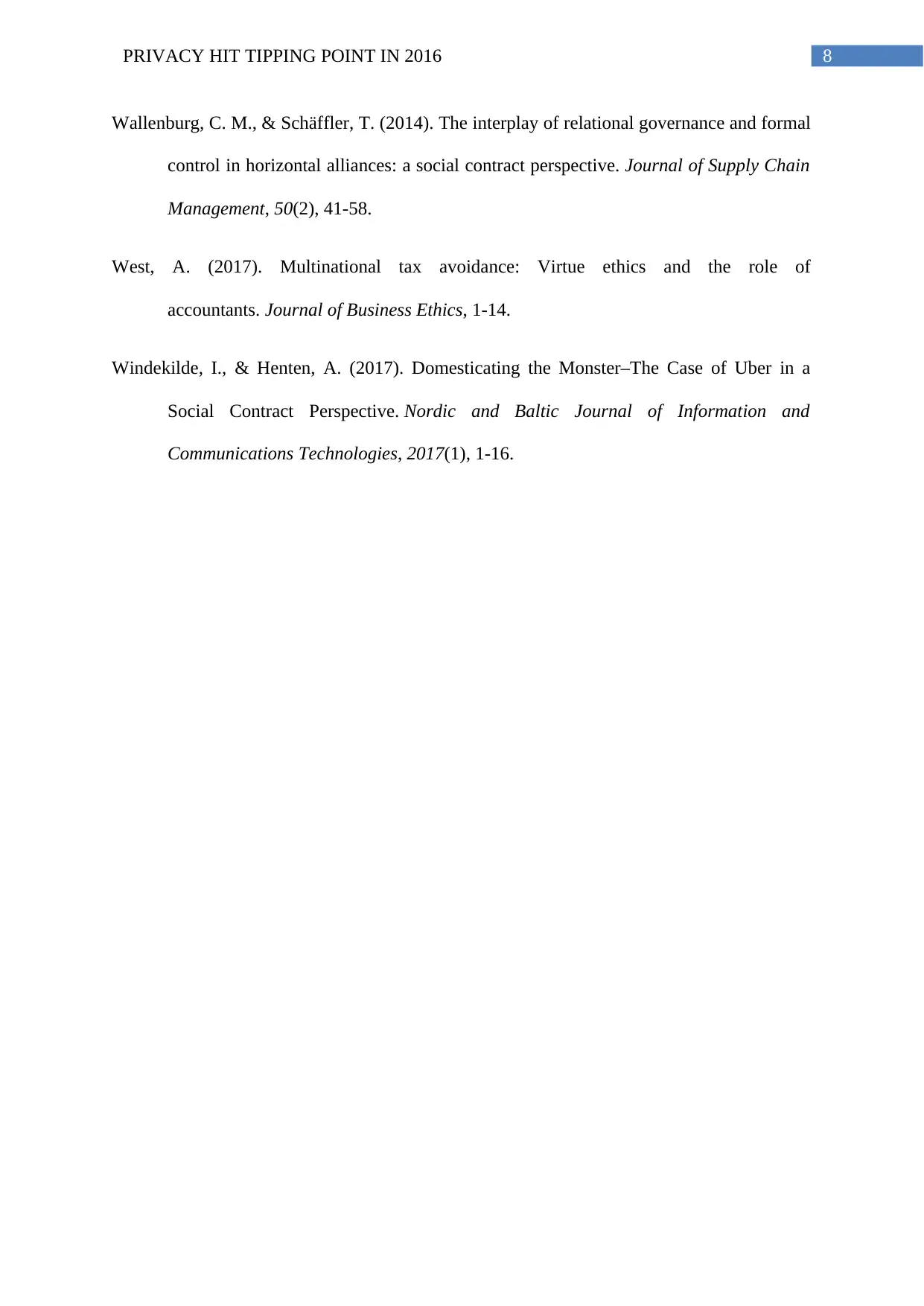
8PRIVACY HIT TIPPING POINT IN 2016
Wallenburg, C. M., & Schäffler, T. (2014). The interplay of relational governance and formal
control in horizontal alliances: a social contract perspective. Journal of Supply Chain
Management, 50(2), 41-58.
West, A. (2017). Multinational tax avoidance: Virtue ethics and the role of
accountants. Journal of Business Ethics, 1-14.
Windekilde, I., & Henten, A. (2017). Domesticating the Monster–The Case of Uber in a
Social Contract Perspective. Nordic and Baltic Journal of Information and
Communications Technologies, 2017(1), 1-16.
Wallenburg, C. M., & Schäffler, T. (2014). The interplay of relational governance and formal
control in horizontal alliances: a social contract perspective. Journal of Supply Chain
Management, 50(2), 41-58.
West, A. (2017). Multinational tax avoidance: Virtue ethics and the role of
accountants. Journal of Business Ethics, 1-14.
Windekilde, I., & Henten, A. (2017). Domesticating the Monster–The Case of Uber in a
Social Contract Perspective. Nordic and Baltic Journal of Information and
Communications Technologies, 2017(1), 1-16.
1 out of 8
Related Documents
Your All-in-One AI-Powered Toolkit for Academic Success.
+13062052269
info@desklib.com
Available 24*7 on WhatsApp / Email
![[object Object]](/_next/static/media/star-bottom.7253800d.svg)
Unlock your academic potential
Copyright © 2020–2026 A2Z Services. All Rights Reserved. Developed and managed by ZUCOL.




